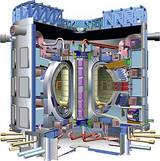Nuclear fusion is the process that drives the sun! It is the opposite of Nuclear Fission, which drives current nuclear power stations. In fission, atoms are split apart to release energy. In fusion, two small atoms are squeezed together so much that they fuse into a single new atom, releasing energy as they do so.
Advantages of Fusion
- Unlike fission, nuclear fusion should be safe. Fusion can only take place under extreme pressure, when a gas is heated and squeezed as much as it is in the sun and other stars. This is done inside a very powerful magnetic field that contains and squeezes the gas. If for some reason the containment field fails, the pressure drops and the fusion reaction shuts down. It simply cannot explode.
- Fuel for fusion will never run out - it can be filtered from sea water
- Fusion produces only very small amounts of relatively short lived radioactive wastes.
Disadvantages
- Despite 50 years of research, scientists have not yet been able to build a fusion reactor that works continuously so that it can be used as a power generator.
- It is very expensive to develop, as research requires creating conditions in the laboratory the same as at the core of the sun.
In theory, nuclear fusion offers the promise of cheap, plentiful, non polluting energy. But nobody knows just how long it will take to make it work.
 Wind power
Wind power




 Wind power
Wind power
 building a nuclear fusion reactor in France
building a nuclear fusion reactor in France BBC Guide to
BBC Guide to  ITER Project
ITER Project
What's your opinion?
Average rating




Not yet rated